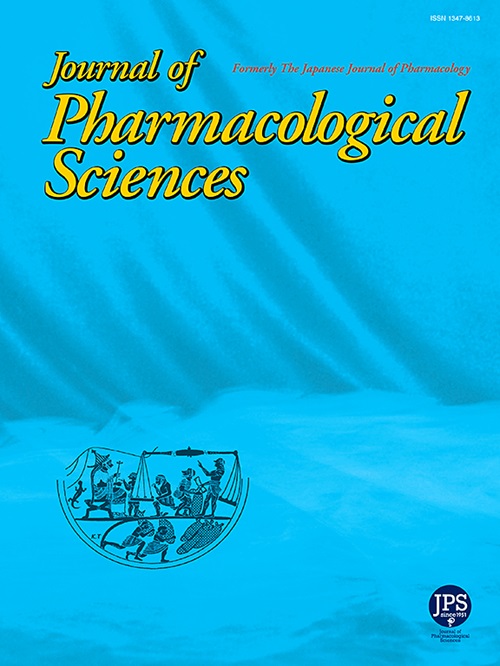Ameliorative effects of Kir4.1 channel inhibitors on lipopolysaccharide-induced cognitive impairment via BDNF/TrkB signaling pathway
IF 2.9
3区 医学
Q2 PHARMACOLOGY & PHARMACY
引用次数: 0
Abstract
Inwardly rectifying potassium 4.1 (Kir4.1) channels are predominantly expressed in astrocytes and considered to be involved in the pathogenesis of brain diseases, including depression and epilepsy. In the present study, we evaluated the effects of Kir4.1 channel inhibitors, VU0134992 and quinacrine, on lipopolysaccharide (LPS)-induced cognitive impairment to clarify the role of Kir4.1 channels in controlling cognitive functions. Male BALB/c mice were treated with LPS, with or without Kir4.1 channel inhibitors, for 7 days. Animals were then subjected to novel object recognition (NOR) and rota-rod tests. Immunohistochemical analyses of glia fibrillary acid protein (GFAP) and neuronal nuclei (NeuN) were also performed. Treatment of LPS clearly showed cognitive impairment in the NOR test, which accompanied elevated GFAP- and reduced NeuN-immunoreactivity in hippocampal CA1 and CA3 regions. VU0134992 and quinacrine significantly ameliorated LPS-induced cognitive impairment without affecting rota-rod performance. In addition, both Kir4.1 channel inhibitors suppressed LPS-induced astrocyte activation and attenuated neuronal damage in CA1 and CA3 regions. Furthermore, combined treatments of ANA-12, a TrkB receptor antagonist, with VU0134992 suppressed the ameliorative effects of VU0134992 on cognitive impairment and hippocampal neuronal damage. These results suggest that blockade of astrocytic Kir4.1 channels ameliorates neuroinflammatory cognitive impairment via BDNF/TrkB signaling pathway.
Kir4.1通道抑制剂通过BDNF/TrkB信号通路改善脂多糖诱导的认知功能障碍
内纠偏钾4.1 (Kir4.1)通道主要在星形胶质细胞中表达,被认为参与包括抑郁症和癫痫在内的脑部疾病的发病机制。在本研究中,我们评估了Kir4.1通道抑制剂VU0134992和quinacrine对脂多糖(LPS)诱导的认知功能障碍的影响,以阐明Kir4.1通道在控制认知功能中的作用。雄性BALB/c小鼠用LPS(含或不含Kir4.1通道抑制剂)治疗7天。然后对动物进行新目标识别(NOR)和旋转棒测试。免疫组化分析神经胶质原纤维酸蛋白(GFAP)和神经元核(NeuN)。LPS治疗在NOR测试中明显显示认知障碍,并伴有海马CA1和CA3区GFAP-升高和neun免疫反应性降低。VU0134992和quinacrine可显著改善lps诱导的认知障碍,但不影响旋转棒的性能。此外,两种Kir4.1通道抑制剂均抑制lps诱导的星形胶质细胞活化,并减轻CA1和CA3区域的神经元损伤。此外,TrkB受体拮抗剂ANA-12与VU0134992联合治疗可抑制VU0134992对认知功能障碍和海马神经元损伤的改善作用。这些结果表明,阻断星形细胞Kir4.1通道可通过BDNF/TrkB信号通路改善神经炎性认知障碍。
本文章由计算机程序翻译,如有差异,请以英文原文为准。
求助全文
约1分钟内获得全文
求助全文
来源期刊
CiteScore
6.20
自引率
2.90%
发文量
104
审稿时长
31 days
期刊介绍:
Journal of Pharmacological Sciences (JPS) is an international open access journal intended for the advancement of pharmacological sciences in the world. The Journal welcomes submissions in all fields of experimental and clinical pharmacology, including neuroscience, and biochemical, cellular, and molecular pharmacology for publication as Reviews, Full Papers or Short Communications. Short Communications are short research article intended to provide novel and exciting pharmacological findings. Manuscripts concerning descriptive case reports, pharmacokinetic and pharmacodynamic studies without pharmacological mechanism and dose-response determinations are not acceptable and will be rejected without peer review. The ethnopharmacological studies are also out of the scope of this journal. Furthermore, JPS does not publish work on the actions of biological extracts unknown chemical composition.

 求助内容:
求助内容: 应助结果提醒方式:
应助结果提醒方式:


